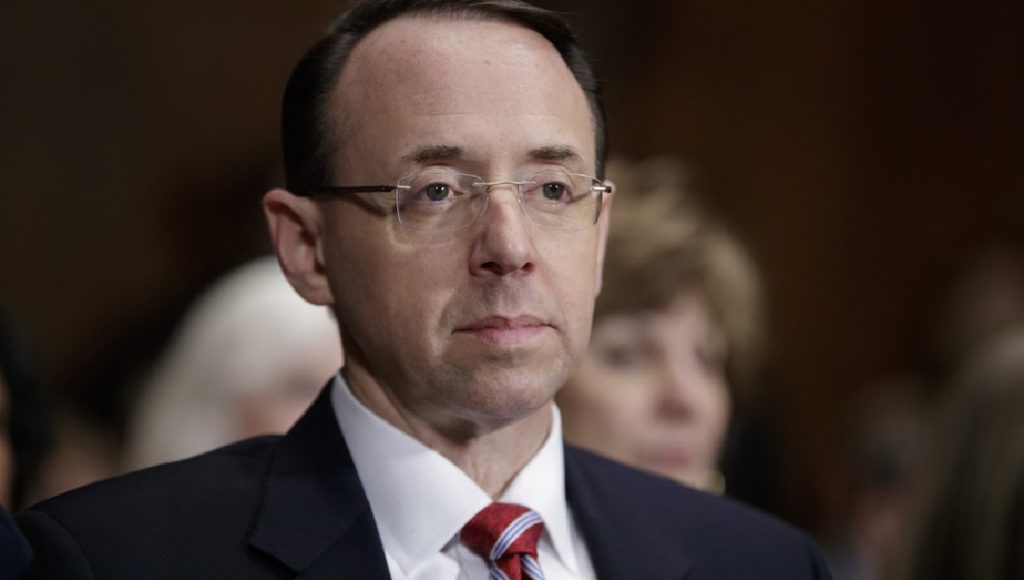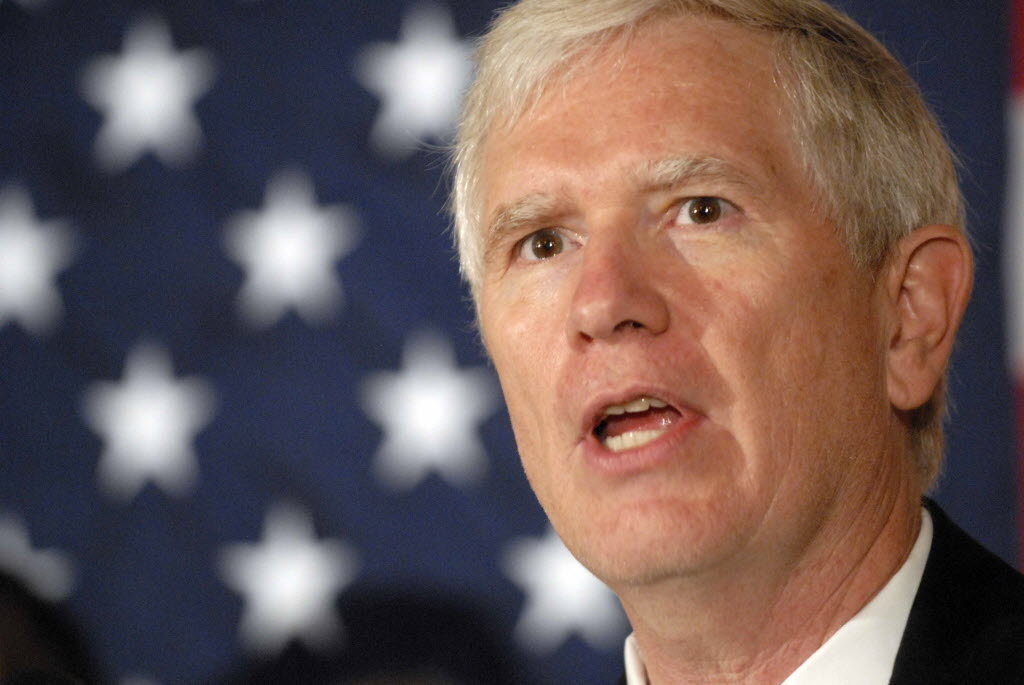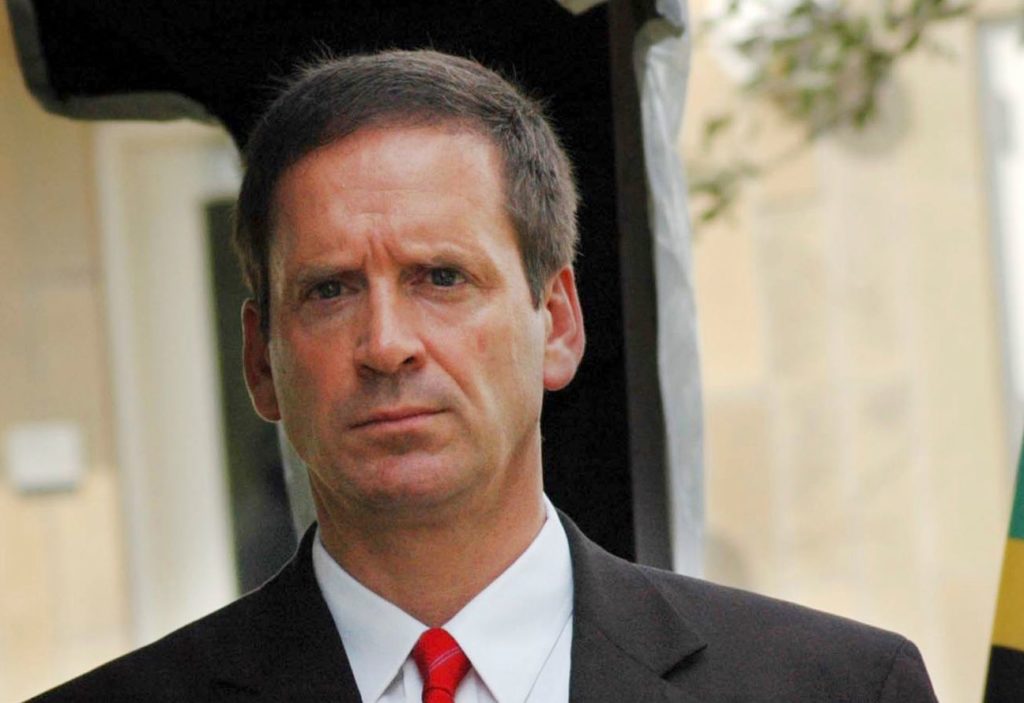Hillary Clinton launching new political group

Stepping deeper into the Democratic resistance, Hillary Clinton launched a new political organization on Monday designed to push back against President Donald Trump‘s agenda. The former Democratic nominee used social media to announce the creation of “Onward Together,” an adaptation from her campaign theme, “Stronger Together.” The group, she tweeted, will “encourage people to get involved, organize, and even run for office.” “This year hasn’t been what I envisioned, but I know what I’m still fighting for: a kinder, big-hearted, inclusive America. Onward!” Clinton wrote. The announcement comes as Clinton, 69, works to find a new role in an evolving political landscape. She recently described herself as an “activist citizen,” but it was unclear how she would continue to inject her voice into national affairs and influence Democratic Party politics. Pondering her future in recent months, she had begun taking long walks in the woods near her suburban New York home, something she joked about on Monday. “The last few months, I’ve been reflecting, spending time with family – and, yes, taking walks in the woods,” she tweeted. Monday’s move all but ensures she will not retain a leadership position at the Clinton Foundation, the continued focus of her husband, former President Bill Clinton, and daughter, Chelsea Clinton. Republicans quickly lashed out at the leading Democrat. Republican National Committee spokesman Michael Ahrens said voters rejected Clinton last fall “because she’s completely out-of-touch, untrustworthy, and embraced the failed policies of the past.” “If Democrats were smart, they’d realize it’s time to move onward from Hillary Clinton altogether,” Ahrens said. For her part, Clinton did not reference Trump directly on Monday, but the group’s mission statement takes an indirect swipe at the Republican president by noting she won almost 66 million votes in the last election. That’s about 3 million more than Trump. Clinton on Monday vowed her organization would support specific groups that help Democrats. She singled out Emerge America, an organization that trains Democratic women to run for office, along with Color of Change, which promotes criminal justice reform and other racial issues. Onward Together is a non-profit organization that does not have to disclose its donors. Clinton becomes the latest high-profile Democrat to launch an independent group. Former President Barack Obama, Vermont Sen. Bernie Sanders, and 2004 Democratic nominee Howard Dean all helped create political organizations. “More than ever, I believe citizen engagement is vital to our democracy,” Clinton tweeted. “I’m so inspired by everyone stepping up to organize and lead.” Republished with permission of The Associated Press.
Bradley Byrne, Gulf colleagues ask Trump Administration for longer red snapper season

Members of the U.S. House of Representatives aren’t giving up on their fight to extend the number of days for the 2017 red snapper season in federal waters. On Monday, Alabama 1st District U.S. Rep. Bradley Byrne, along with four other Members of Congress representing districts on the Gulf Coast, sent a letter to Secretary of Commerce Wilbur Ross urging him to extend the number of days. Currently, the season is scheduled to run from June 1-3, making it the shortest red snapper season ever in the Gulf of Mexico. “A three day red snapper season is simply not acceptable, especially given how many red snapper there are in the Gulf right now. Anyone who knows anything about Gulf Coast fisheries would agree that the red snapper fishery is incredibly healthy,” Byrne said of his request. “By bringing other Gulf Coast Congressmen together, I am hopeful we can get the Trump Administrative and Secretary Ross to provide some relief for our recreational fishermen ahead of the 2017 federal season.” In asking for a longer season, the Gulf Coast congressmen — Louisiana-Republican Garrett Graves, Texas-Republicans Randy Weber and John Carter, and Mississippi-Republican Steven Palazzo — pointed to the inaccurate data the National Marine Fisheries Service used to set the 2017 data. “Our recreational fishermen are being penalized by NOAA for a statistical anomaly,” the letter stated. “Currently, NOAA’s data says that recreational fishermen exceeded last year’s quota by 129,906 pounds. However, 129,000 pounds represents less than .02 percent of the recreational quota.” Read the full text of the letter below: Dear Secretary Ross, We write today to express our disappointment in the recent announcement from the National Marine Fisheries Service (NMFS) of a three day recreational Red Snapper season. It is unacceptable. We ask that you reevaluate this decision and extend the number of days for the 2017 season. On March 21st, we wrote to you about the importance of access to adequate fishing resources in the Gulf of Mexico, and namely Red Snapper. You responded that the Red Snapper fishery is a high priority for you and your department, and therefore it is time for more than three days. Our recreational fishermen are being penalized by NOAA for a statistical anomaly. Currently, NOAA’s data says that recreational fishermen exceeded last year’s quota by 129,906 pounds. However, 129,000 pounds represents less than .02 percent of the recreational quota. This decision has no bearing on the health of the stock, and there is no chance NOAA is representing the number with any degree of accuracy. At the state level, we continue to see report numbers that do not match NMFS’s data, caused by the lack of real-time information. For example, in Alabama, preliminary estimates for 2016 show a total of approximately 821,000 pounds counted by Alabama’s Snapper Check Program. NOAA’s estimates for the same time show approximately 2 million pounds accounted for. Mississippi’s data shows the opposite problem. According to data from Mississippi’s Tails n’ Scales Program, almost 40,000 pounds were accounted for, yet NOAA’s data claims there were zero pounds taken. It is time for recreational anglers to stop being penalized for NOAA’s bad science and lack of coordination. In short, there is serious doubt that federal data is accurately reflecting the number of Red Snapper in the Gulf. For that reason, we feel revaluating your agency’s decision for the 2017 season is warranted, and we urge you to continue working with us to develop a long-term solution to address these issues impacting our recreational fishermen and coastal communities. Thank you for your attention to this matter. We look forward to hearing from you.
Travel ban judges scrutinize Donald Trump’s Muslim statements

Federal judges on Monday peppered a lawyer for President Donald Trump with questions about whether the administration’s travel ban discriminates against Muslims and zeroed in on the president’s campaign statements, the second time in a week the rhetoric has faced judicial scrutiny. Acting Solicitor General Jeffrey Wall, defending the travel ban, told the three-judge panel of the 9th U.S. Circuit Court of Appeals that the executive order should be reinstated because it falls well within the president’s authority. “No one has ever attempted to set aside a law that is neutral on its face and neutral in its operation on the basis of largely campaign trail comments made by a private citizen running for office,” he said. Further, Wall said the president had backed off the comments he made during the campaign, clarifying that “what he was talking about was Islamic terrorist groups and the countries that sponsor or shelter them.” Neal Katyal, who represented Hawaii, a plaintiff in the lawsuit, expressed disbelief at that argument and said Trump had repeatedly spoken of a Muslim ban during the presidential campaign and after. “This is a repeated pattern of the president,” Katyal said. The 9th Circuit panel was hearing arguments over Hawaii’s lawsuit challenging the travel ban, which would suspend the nation’s refugee program and temporarily bar new visas for citizens of Iran, Libya, Somalia, Sudan, Syria and Yemen. The judges will decide whether to uphold a Hawaii judge’s decision in March that blocked the ban. Last week, judges on the 4th Circuit Court of Appeals heard arguments over whether to affirm a Maryland judge’s decision putting the ban on ice. They also questioned whether they could consider Trump’s campaign statements, with one judge asking if there was anything other than “willful blindness” that would prevent them from doing so. Dozens of advocates for refugees and immigrants rallied outside the federal courthouse in Seattle, some carrying “No Ban, No Wall” signs. Wall’s insistence that the travel ban should be upheld because it is “neutral,” without reference to Islam, drew pointed questions from Judge Richard Paez. An executive order issued by President Franklin Roosevelt that led to the internment of 110,000 Japanese-Americans during World War II similarly was couched as a necessity for national security and made no reference to residents of Japanese heritage, Paez noted. The U.S. Supreme Court upheld that executive order in a challenge brought by California resident Fred Korematsu. The ruling is now widely considered regrettable. “Would the Korematsu executive order pass muster under your test today?” Paez grilled Wall. “No, Judge Paez,” he answered “Why not? ‘Facially legitimate’ – that’s all you say!” Paez said. “You emphasize ‘facially legitimate.’” “I want to be very clear about this,” Wall said solemnly. “This case is not Korematsu, and if it were I wouldn’t be standing here and the United States would not be defending it.” Wall went on to argue that unlike the Korematsu case, Trump’s executive order probably wouldn’t be questioned but for the statements he made as a candidate. Paez also questioned Katyal about Trump’s statements, calling them “profound.” But the judge wondered whether Trump is forever forbidden from adopting an executive order along the lines of his travel ban. Katyal said no, and suggested the president could begin by repudiating his earlier statements or by working with Congress. “If you rule for him, you defer to the president in a way that history teaches us is very dangerous,” Katyal said. Monday’s arguments marked the second time Trump’s efforts to restrict immigration from certain Muslim-majority nations have reached the San Francisco-based 9th Circuit. After Trump issued his initial travel ban on a Friday in late January, bringing chaos and protests to airports around the country, a Seattle judge blocked its enforcement nationwide – a decision that was unanimously upheld by a three-judge 9th Circuit panel. The president then rewrote his executive order, rather than appeal to the U.S. Supreme Court, and in March, U.S. District Judge Derrick Watson in Honolulu blocked the new version from taking effect, citing what he called “significant and unrebutted evidence of religious animus” in Trump’s campaign statements. “Again, in this court, the President claims a nearly limitless power to make immigration policy that is all but immune from judicial review,” Hawaii Attorney General Douglas Chin wrote to the 9th Circuit. “Again, he must be checked.” At his daily briefing, White House press secretary Sean Spicer expressed confidence that the executive order will be upheld by the appeals court. “The executive order is fully lawful and will be upheld. We fully believe that,” Spicer said. The travel ban cases are expected to reach the Supreme Court, but that would likely be cemented if the 4th and 9th Circuits reach differing conclusions about its legality. Because of how the courts chose to proceed, a full slate of 13 judges heard the 4th Circuit arguments last week, while just three, all appointees of President Bill Clinton, will consider the case in Seattle. With the possibility for myriad concurring or dissenting opinions, it could take the 4th Circuit longer to rule, noted Carl Tobias, a law professor at University of Richmond law school in Virginia. Republished with permission of The Associated Press.
Deputy AG to brief Senate on Donald Trump’s firing of FBI’s James Comey

Deputy Attorney General Rod Rosenstein will brief all members of the Senate on Thursday about President Donald Trump’s firing of FBI Director James Comey. That’s the word from Senate Majority Leader Mitch McConnell’s office on Monday. Last week, Democratic Leader Chuck Schumer said he made a request for Rosenstein to answer lawmakers’ questions about his memo on Comey and the circumstances surrounding his dismissal. Republished with permission of The Associated Press.
First lady: Barron Trump to attend private Episcopal school in MD

First lady Melania Trump announced Monday that her son, Barron, will attend a private Episcopal school in Maryland, beginning this fall. The announcement answered one of the lingering questions surrounding the first family’s unusual living arrangement. Mrs. Trump and 11-year-old Barron have been living at Trump Tower in New York since Donald Trump took office in January, while the president has lived at the White House. Trump has said his wife and youngest child will relocate to the White House after the current school year ends, which meant finding a local school for Barron. Mrs. Trump said Monday that they have chosen St. Andrew’s Episcopal School in Potomac, Maryland, for their son. “It is known for its diverse community and commitment to academic excellence,” she said in a statement. “The mission of St. Andrew’s is ‘to know and inspire each child in an inclusive community dedicated to exceptional teaching, learning, and service,’ all of which appealed to our family.” Annual tuition ranges from more than $23,000 for pre-K to more than $40,000 for students in grades 9-12. “We look forward to the coming school years at St. Andrew’s,” Mrs. Trump said. Founded in 1978, St. Andrew’s, a day school, has a total enrollment of 580 students in prekindergarten through 12th grade, according to its website. Class sizes are small, with anywhere from 11 to 13 students, and all of its graduates go on to college, the school said. “As we came to know Barron through the admission process, it became clear that he, like all of our newly enrolled students, will be a great addition to St. Andrew’s,” school administrators wrote in a letter to parents on Monday. A spokesman said the head of the school, Robert Kosasky, would not have any additional comment out of respect for students’ privacy. The school is known for research-informed teaching and the use of neuroscience and other brain-based research, both to help high-achieving students unlock their potential and to tailor education to children with learning disabilities or differences. Barron currently attends Columbia Grammar and Preparatory School on the Upper West Side of Manhattan. St. Andrew’s is located in the wealthy enclave of Potomac, about 17 miles northwest of the White House and a 30-minute drive in light traffic. “School leaders are working directly with the Secret Service to ensure that … logistics and security will continue to work smoothly and discreetly next year for all of our students and families,” the letter to parents said. The Trumps’ decision to send Barron to St. Andrew’s marks the first time in decades that the school-aged child of a president will attend a school other than at Sidwell Friends, an elite Quaker school with campuses in Washington and Bethesda, Maryland. President Bill Clinton‘s daughter, Chelsea, attended Sidwell. So did President Barack Obama‘s daughters, Malia and Sasha. Malia Obama, 18, graduated from Sidwell in June 2016. She is taking the year off, what is known as a “gap year,” before her expected enrollment at Harvard this fall. Sasha Obama, 15, is a sophomore at Sidwell Friends. Her parents decided to live in Washington after leaving the White House so she can finish her studies there. President George W. Bush‘s daughters had graduated high school and were headed to college when he was elected. President Jimmy Carter is the only recent president to send his child, daughter Amy, to a District of Columbia public school. Republished with permission of The Associated Press.
On 45th anniversary of shooting, Jim Zeigler asks Kay Ivy to return Wallace’s portraits to Rotunda

On this 45th anniversary of the shooting of former Alabama Gov. George Wallace, State Auditor Jim Zeigler is asking that the portraits of former-Governors George and Lurleen Wallace be returned to the state capitol rotunda. Zeigler sent a written request Monday to Gov. Kay Ivey asking her to return the Wallace’s portraits to their historic location. Both Wallace portraits were removed from the rotunda in January 2015 by then-Gov. Robert Bentley in a move the auditor calls a move to re-write Alabama’s history. “The Alabama Legislature passed joint resolutions in 1983 mandating that the Wallace portraits remain in the rotunda in perpetuity. It was clearly the legislative intent that this be done,” Zeigler wrote in his request to Ivy. “Your action in restoring the Wallace portraits to their rightful place would be a bold statement that we in Alabama respect our heritage and reject historical revision.” Below is the full text of Zeigler’s request: I hereby request that you return the portraits of Governors George and Lurleen Wallace to their legal and historical place in the capitol rotunda. The Alabama Legislature passed joint resolutions in 1983 mandating that the Wallace portraits remain in the rotunda in perpetuity. It was clearly the legislative intent that this be done. The Wallace portraits had been displayed in the rotunda until January 2015, when they were suddenly removed by the Bentley administration. Your action in restoring the Wallace portraits to their rightful place would be a bold statement that we in Alabama respect our heritage and reject historical revision. When I attempted to get the previous administration to return the Wallace portraits to the rotunda, officials of that administration reflexively thought up excuses not to do so. Each one of those excuses was flawed. If you were to hear reasons not to return the Wallace portraits, I would request the opportunity to meet with you to address those excuses. On May 15, 2017, we observe the 45th anniversary of the attempted assassination of Gov. George Wallace. What a wonderful tribute it would be to Alabama’s only four-time governor and presidential candidate to have you right this wrong and restore the Wallace portraits to their historical and legal place. Thank you for your consideration and action.
Court likely to question if Donald Trump’s travel ban discriminates

For the second time in a week, government lawyers will try to persuade a federal appeals court to reinstate President Donald Trump‘s revised travel ban – and once again, they can expect plenty of questions Monday about whether it was designed to discriminate against Muslims. A three-judge panel of the 9th U.S. Circuit Court of Appeals has scheduled arguments in Seattle over Hawaii’s lawsuit challenging the travel ban, which would suspend the nation’s refugee program and temporarily bar new visas for citizens of Iran, Libya, Somalia, Sudan, Syria and Yemen. Last week, judges on the 4th Circuit Court of Appeals heard arguments over whether to affirm a Maryland judge’s decision putting the ban on ice. They peppered Acting Solicitor General Jeffrey Wall with questions about whether they could consider Trump’s campaign statements calling for a ban on Muslims entering the U.S., with one judge asking if there was anything other than “willful blindness” that would prevent them from doing so. Monday’s arguments mark the second time Trump’s efforts to restrict immigration from certain Muslim-majority nations have reached the San Francisco-based 9th Circuit. After Trump issued his initial travel ban on a Friday in late January, bringing chaos and protests to airports around the country, a Seattle judge blocked its enforcement nationwide – a decision that was unanimously upheld by a three-judge 9th Circuit panel. The president then rewrote his executive order, rather than appeal to the U.S. Supreme Court, and in March, U.S. District Judge Derrick Watson in Honolulu blocked the new version from taking effect, citing what he called “significant and unrebutted evidence of religious animus” in Trump’s campaign statements. “Again, in this court, the President claims a nearly limitless power to make immigration policy that is all but immune from judicial review,” Hawaii Attorney General Douglas Chin wrote to the 9th Circuit. “Again, he must be checked.” The administration’s lawyers are seeking to persuade the judges that the lower court’s decision is “fundamentally wrong,” and that the president’s order falls squarely within his duty to secure the nation’s borders. The order as written is silent on religion, and neither Hawaii nor its co-plaintiff, the imam of the Muslim Association of Hawaii, has standing to sue, they say – arguments that were rejected in the lower court. The travel ban cases are expected to reach the Supreme Court, but that would likely be cemented if the 4th and 9th Circuits reach differing conclusions about its legality. Because of how the courts chose to proceed, a full slate of 13 judges heard the 4th Circuit arguments last week, while just three, all appointees of President Bill Clinton, will sit in Seattle. For that reason – with the possibility for myriad concurring or dissenting opinions – it could take the 4th Circuit longer to rule, noted Carl Tobias, a law professor at University of Richmond law school in Virginia. Republished with permission of The Associated Press.
Auburn agrees to pay $29K to dismiss lawsuit over white nationalist

Auburn University has agreed to pay nearly $29,000 in legal costs to dismiss the lawsuit that ultimately cleared the way for controversial white nationalist Richard Spencer‘s to speak at the university last month. The suit was filed by Cameron Padgett when the University attempted to cancel Spencer’s visit, citing the possibility of “civil unrest.” “Auburn University supports the rights and privileges afforded by the First Amendment. However, when the tenets of free speech are overshadowed by threats to the safety of our students, faculty and staff, we have a responsibility to protect our campus,” the Auburn University Provost’s Office said in an April statement. Ultimately, a judge ruled in Padgett’s favor, allowing Spencer, the director of the white nationalist think tank National Policy Institute, to speak at the university. Several hundred people attended. On Thursday, Padgett and the University reached an agreement “avoid more costly litigation” that would cover the costs of the legal hearings. A federal judge in Montgomery dismissed the lawsuit following the filing of their agreement.
Mo Brooks announces run for Jeff Sessions’ former U.S. Senate seat

Alabama 5th District U.S. Rep. Mo Brooks joined a crowded Republican field vying for the the U.S. Senate formerly held by Jeff Sessions, when he announced Monday morning he will run in Alabama’s special Senate election later this year. The three-term Congressman launched his candidacy with an email announcement, saying he is “the only candidate for the Senate who has a record of proven conservative leadership.” “I am running for the United States Senate because America’s status as the greatest nation in world history is at risk, because Congress is failing the American people by not rising to the challenges America faces, and because I am the only candidate for the Senate who has a record of proven conservative leadership,” Brooks said. Brooks scheduled a series of appearances across the Yellowhammer State to announce his candidacy. He began in Huntsville, with stops scheduled in Birmingham, Montgomery and Mobile the rest of the day. The seat is currently held by former Alabama Attorney General Luther Strange. Strange is also running for the seat. Former Chief Justice of the Alabama Supreme Court Roy Moore; State Rep. Ed Henry; President of the Christian Coalition of Alabama Dr. Randy Brinson, and Birmingham businessman Dom Gentile are also running for the GOP nomination. The deadline for candidates to qualify for the Senate run is May 17. The primary vote is August 15. The special election is December 12. Full text of Brooks’ speech below: I hereby announce my candidacy for the United States Senate. At the conclusion of this announcement, I will drive to the Alabama Republican headquarters in Birmingham and file my qualifying papers. I am running for the United States Senate because America’s status as the greatest nation in world history is at risk, because Congress is failing the American people by not rising to the challenges America faces, and because I am the only candidate for the Senate who has a record of proven conservative leadership. Let me be clear, for 75 years America has been unquestionably the greatest nation in world history. America enjoys a standard of living that is the envy of most of the world. America’s military prowess is unparalleled in world history. America is a beacon of freedom for all. America is not great because we are lucky. America is great because foundational principles have made us who we are. First, we are a Republic, which means we, as American citizens, control our government. Second, we enjoy a bill of rights that guarantees our freedoms are protected from abusive government power. Third, we are a nation of moral principles that act as a compass to guide us to do the right thing. Fourth, America enjoys a free enterprise economy that, over time, has made us the world’s greatest economic superpower. Finally, we have been blessed by our ancestors: people who worked hard and sacrificed so that we could enjoy a better future. But today, America is at risk. History reveals that great nations rarely fall from the outside. Rather, great nations fall because of weakness from within. Today, America’s elections are threatened by those who oppose voter identification laws and want to allow noncitizens to vote in America elections. Our 2nd Amendment Right to Bear Arms is threatened by powerful political forces that seek to disarm America. America’s moral principles are threatened by those who seek to destroy our values and faith in God. America’s economy is threatened by the twin evils of Socialism and deficits and debt that increasingly risk a debilitating insolvency and bankruptcy of America. The solutions to America’s challenges are there. The roadblock to these solutions is the United States Senate. In order to preserve America’s status as the greatest nation in world history, we must elect senators with the understanding and backbone needed to face and defeat America’s challenges. In that vein, I offer myself as candidate for the United States Senate because I am the only candidate with a proven record of conservative leadership. As you know, every election cycle a lot of candidates talk that talk. What distinguishes me from those candidates is that I have also walked the walk. The proof is my record of conservative leadership. As a freshman Congressman, The United States Business and Industry Council, representing 2000 manufacturers and 200,000 American jobs, awarded me their “Fighting Freshman of the Year” award because my record was #1 out of 93 freshmen as “a stalwart defender of domestic American industry, technology, innovation, and job creation.” That’s proven conservative leadership. During my six years in Congress, the Club for Growth has consistently graded me in the top 20% of all Congressmen on “economic policies that strengthen our nation’s economy and shrink the size of the federal government.” That’s proven conservative leadership. During my six years in Congress, the National Taxpayers Union has consistently graded my record at the top of the Alabama Congressional Delegation, tied with Congressmen Bradley Byrne and Gary Palmer, on issues concerning “tax relief and reform, lower and less wasteful spending, individual liberty, and free enterprise.” That’s proven conservative leadership. During my six years in Congress, the American Conservative Union has graded my record in the top 20% of all Congressmen, with an overall “A” grade during the last session of Congress, on issues relating to “liberty, personal responsibility, traditional values, and strong national defense.” That’s proven conservative leadership. During the last session of Congress, Heritage Action, the political wing of the Heritage Foundation, ranked my record in the Top 10 of all Congressmen on “principles of free enterprise, limited government, individual freedom, traditional American values, and a strong national defense.” That’s proven conservative leadership. During my six years in Congress, NumbersUSA has graded my record a perfect 100%/A+ score in the fight to secure America’s borders and protect American families’ wages and jobs from the damage done by illegal aliens. Stated differently, over the past six years, no Congressman has had a better border security record than I have. That’s proven conservative leadership. Today, America’s challenges are great, perhaps the most challenging in a generation. But, you
Broad support, big challenge for Donald Trump’s foreign aid nominee

Mark Green is a rare bird in Washington these days – a Donald Trump nominee with broad bipartisan support. But there’s a catch to his potential posting as administrator of the U.S. Agency for International Development. The agency faces a starkly uncertain future, including potentially big budget cuts and the possibility of being folded entirely into a restructured State Department. Within hours of the White House’s announcement of his nomination this past week, the former Republican congressman from Wisconsin and U.S. ambassador to Tanzania under President George W. Bush had collected an impressive array of endorsements from lawmakers in both parties, and from development groups that had up to then largely opposed other Trump nominees and policies. That bodes well for Green’s confirmation, even if it may not be enough to stave off what some see as the Trump administration’s intent to dismantle USAID. “There’s no way Ambassador Green, or anyone for that matter, could effectively execute the mission of USAID under the proposed cuts and changes that President Trump is proposing for this critical agency,” said Democratic Sen. Chris Coons of Delaware, a member of the Senate Foreign Relations Committee that will evaluate the nomination. The cuts “would devastate the United States’ ability to conduct diplomacy and development and harm our national interests.” Created in 1961 by President John F. Kennedy, USAID oversees American civilian assistance abroad, including health, education, environment, democracy and economic programs, and provides emergency humanitarian aid in response to natural disasters. It administers more than $20 billion in foreign assistance each year. Although it takes direction from the State Department, USAID is an independent agency. The administration’s initial proposal for the 2018 budget called for slashing State Department and USAID funding by 31 percent. Secretary of State Rex Tillerson has countered by proposing a 26 percent cut and creating a committee to study USAID’s full integration into his department. The effect on specific programs won’t be known until later this month when the entire spending plan is submitted to Congress. The panel considering USAID’s future is to start meeting this summer and deliver findings several months later. Rep. Nita Lowey of New York, who as the House Appropriations Committee’s top Democrat will play a major role in determining the dollars for diplomacy and development, welcomed Green’s nomination. She said he “understands just how important effective foreign assistance is to U.S. national security.” Green, through a spokeswoman for the International Republican Institute he now leads, declined to comment about his plans for USAID, citing protocol that nominees avoid speaking publicly before their confirmation hearings. The institute promotes democracy, multi-party political systems and electoral processes and civic development around the world. It is not affiliated with the Republican Party but does have loose connections to the GOP. Green was a Republican congressman from Wisconsin and the organization’s board includes other former and current Republican lawmakers. In addition to serving in Congress and as ambassador, Green was involved in creating President George W. Bush’s PEPFAR program, which combats AIDS, and was on the board of the Millennium Challenge Corporation, another Bush-era initiative that awards grants to foreign countries that commit to good governance and anti-corruption policies. “Mark is familiar to many of us,” said Wade Warren, USAID’s acting director. He praised Green for his work on democracy, human rights, and governance programs, and overseeing “some of the U.S. government’s largest development programs.” Warren also credited Green for championing legislation as a congressman to promote global health. Tillerson has made clear changing were coming to USAID, even with Green at the helm. He said this past week that Green would “help us prioritize where America’s future development investments will be spent so that we can ensure every tax dollar advances our country’s security and prosperity.” Republican lawmakers, including some opposed to drastic cuts in foreign assistance, echoed calls for Green to streamline the agency. Green is “uniquely qualified to lead a modernized USAID,” said GOP Rep. Ed Royce of California, chairman of the House Foreign Relations Committee. He said he would work with Green to make the agency “more efficient and effective so that it can continue the critical missions of promoting economic growth, saving lives, and promoting democracy and human rights.” Nongovernmental development organizations hope Green staves off major changes The Modernizing Foreign Assistance Network, a bipartisan advocacy group that has called Trump’s proposed budget cuts “reckless,” said it looked forward to Green “maintaining the elevated role of USAID, which has been transformed during the last two administrations into a modern and accountable institution.” The anti-poverty One Campaign, which has said the aid cuts would be “disastrous,” cited Green’s “long history of thoughtful leadership on America’s development assistance strategy.” Saying he would make a strong USAID leader, the group said Green’s “leadership will be particularly important and tested as he grapples with the unprecedented cuts proposed to USAID in the president’s budget.” Republished with permission of The Associated Press.
Bradley Byrne: Fight continues for longer red snapper season

We are blessed to live in a part of the world known for our beautiful scenery, abundant natural resources, and marvelous waterways. It is easy to see why my family has not left Southwest Alabama since my great, great, great grandfather settled here in the 1780s. A critical part of our local culture is the Gulf of Mexico, including a wide range of fish that call the Gulf home. Like so many others, my family has gone fishing in the Gulf for as long as I can remember. Given how important fishing is to so many, I was incredibly frustrated to learn that this year’s Red Snapper season in federal waters will only be three days. That is simply not acceptable and a further indication of how poorly the federal government is managing the Red Snapper fishery. During a recent House Oversight Committee hearing on Red Snapper, I pointed out that preliminary estimates done by the state for 2016 show a total of approximately 821 thousand pounds of Red Snapper caught in waters off of the Alabama coast. Federal estimates for the same time show approximately 2 million pounds accounted for. Mississippi’s data shows the opposite problem. According to data from Mississippi’s Tails n’ Scales Program, almost 40,000 pounds were accounted for, yet federal data claims there were zero pounds. The system is completely broken. Since being elected to Congress, I have made Red Snapper a top priority. We passed a bill out of the House in 2015 that would have repealed the quota system and given the Gulf states control over the data collection and stock assessments. I personally wrote and championed these provisions with the support of other Gulf Coast colleagues. While we succeeded in getting the bill out of the House, I was very disappointed the Senate failed to even take up the bill. I want to be clear: Red Snapper is not an issue that just comes up once a year in my office. In fact, we work year round to increase awareness, build support, and push for a permanent solution. We are utilizing a strategy focused on both an administrative and legislative solution. First, I am hopeful that under President Donald Trump we can get some relief. President Trump is a big believer in rolling back regulations and getting the government out of the way. There is no better example of big government micromanagement and failure than the Red Snapper issue. With a new director of the National Oceanic and Atmospheric Administration (NOAA), which oversees the National Marine Fisheries Service, I hope we can get back to longer seasons, more local data, and a balanced system that actually works. Second, I am going to continue working with my Gulf Coast colleagues on legislation to fix the system and get us longer seasons for recreational fishermen. Discussions are actively ongoing about a legislative solution that tackles this issue head on and gives more control to the individual Gulf states. We did receive a bit of good news. With the help of Senator Richard Shelby, we were able to secure a permanent expansion of state waters out to nine miles Gulf-wide. In the past, some Gulf states had state waters out to nine miles while others, like Alabama, only had three miles of state waters. Permanently expanding the state waters to nine miles for Red Snapper will provide parity among the Gulf states and give important certainty to our fishermen as they work to further build up the artificial reef system in state waters. The fight for a longer Red Snapper season continues, and I am more emboldened than ever before to get us a solution. • • • Bradley Byrne is a member of U.S. Congress representing Alabama’s 1st Congressional District.
Team aims to find site of missing Tuskegee Airman’s plane

Unless they’re named Indiana and wear a fedora, archaeologists typically don’t attempt to solve historical mysteries in a single summer. But that’s exactly what University of New Orleans archaeologist D. Ryan Gray is hoping to do this summer when he leads a team of students and others to southern Austria, to investigate a site where they believe one of the famed Tuskegee Airmen went down near the end of World War II. The site, close to the Italian border and the Austrian town of Villach, is near the last reported sighting of Capt. Lawrence Dickson, a pilot with the 332nd Fighter Group of the 100th Fighter Squadron. Just after midday Dec. 23, 1944, Dickson was flying a reconnaissance mission in his P-51D when he radioed his wingman, 2nd Lt. Robert Martin, that he was having problems and was going to have to eject. Martin told authorities that he saw Dickson’s canopy jettison but never saw Dickson’s parachute, though possibly because it blended with the snow covering the ground. Since then, Dickson has been classified as missing. Dickson and Martin were both black pilots in World War II, when the U.S. armed forces were still segregated. The 332nd Fighter Group was made up of black pilots who had trained at the Tuskegee Institute in Alabama and became known as the Tuskegee Airmen. Officials with the Defense POW/MIA Accounting Agency, whose mission is to account for all missing U.S. service members, won’t confirm that the crash site Gray will be investigating is suspected to be Dickson’s. But a review of documents, as well as accounts from locals who said they witnessed the crash, has led some experts to believe the site is worth exploring. Gray said he is excited about the challenge of excavating an aircraft from World War II, something he’s never done before. And there is the added bonus of perhaps being able to bring a war hero home. “We are hoping to resolve this case this summer,” he said of a five-week dig season. Unlike typical archaeological excavations, which are painstakingly meticulous and intentionally slow in order to be comprehensive, this one has a different objective: to confirm the type of plane that crashed there and then identify any human remains that may be found. If that is accomplished, then the POW/MIA agency will begin the process of preparing a proper recovery. Gray and the 13 UNO students will have ample help in their efforts. They will be joined by two students from the University of Innsbruck, in Austria, as well as academic staff there who have a special interest in World War II and aircraft archaeology. They also will get help from Tom Czekanski, a senior curator at the National World War II Museum in New Orleans who is an expert on P-51s, the plane Dickson flew. Czekanski said he plans to look for the P-51’s notable characteristics: a Packard-built Merlin engine, a type of propeller known as a Hamilton Standard or the type of wheels and struts that formed the landing gear. “Those are all distinctive for the P-51,” he said. And though Czekanski is excited about maybe finding the plane, he is even more hopeful that the team can bring some closure to the 70-year-old case. “I think the most rewarding part will be if we can find the remains of an individual who’s been lost and be able to bring him home,” he said. “That’s the meaningful point of this.” Republished with permission of The Associated Press.


